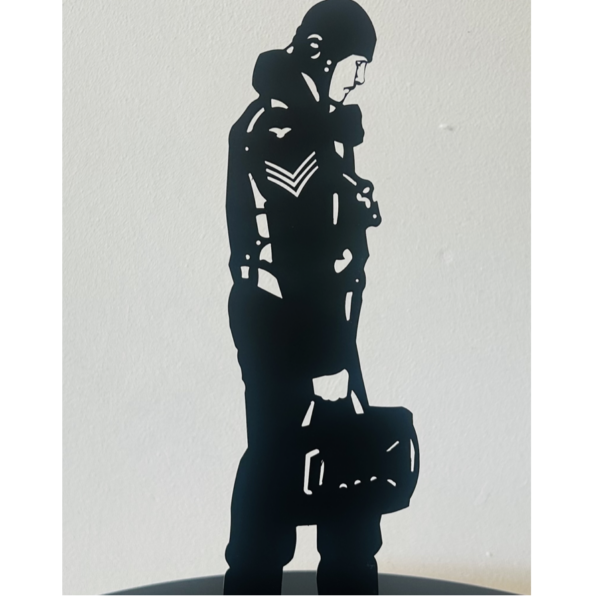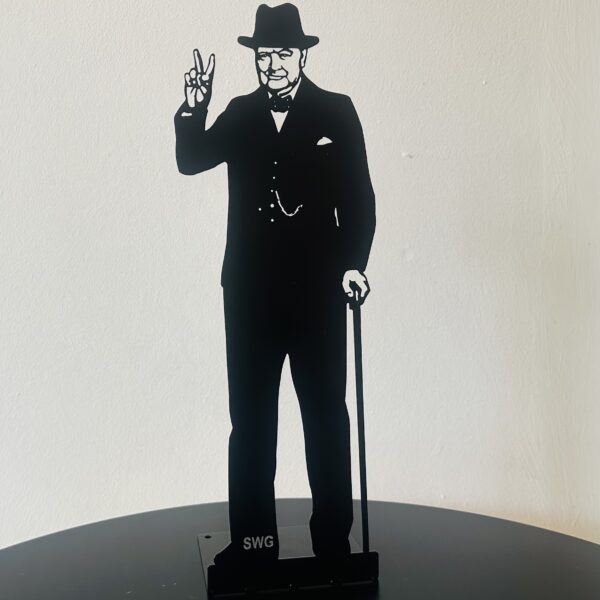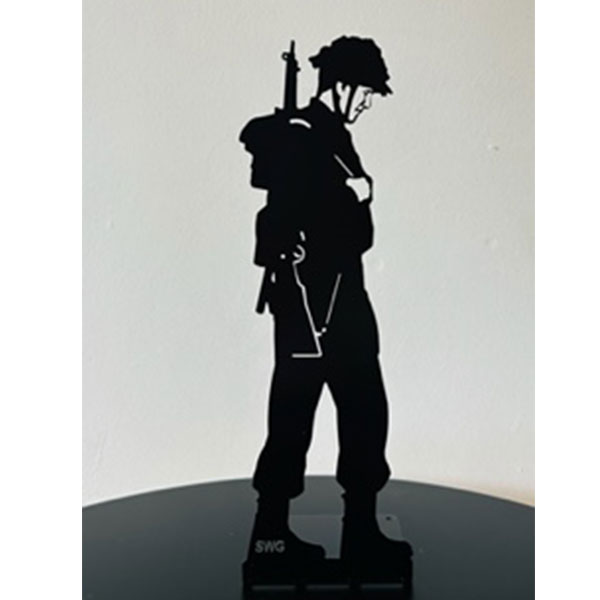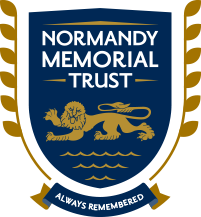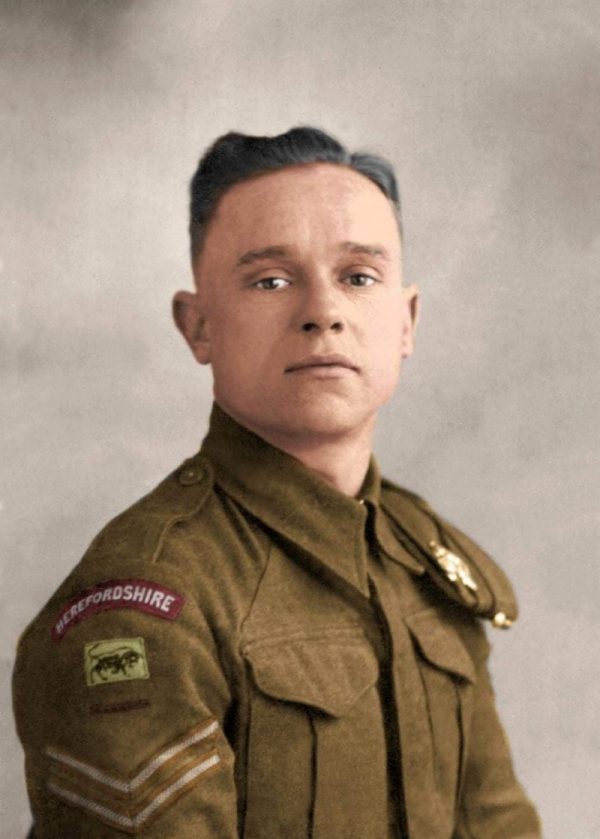
Joseph Alfred Curtis #1
This story and photo is shared by the Trust with kind permission from Bob Curtis, nephew of Joseph Curtis
My uncle Joseph Curtis has no immediate surviving family but I have been researching his life and death over the past 4 years. I have been able to discover such a lot of information, particularly the circumstances of precisely when, where and how he lost his life.
Joseph was born 30 March 1917 in Coventry. He was the fourth child of eight born to Charles and Eliza Curtis. He attended Red Lane School where he met Ruby Bird who eventually became his wife. On leaving school he worked at Hewins and Mills Butter Manufacturers as a butter blender and warehouseman.
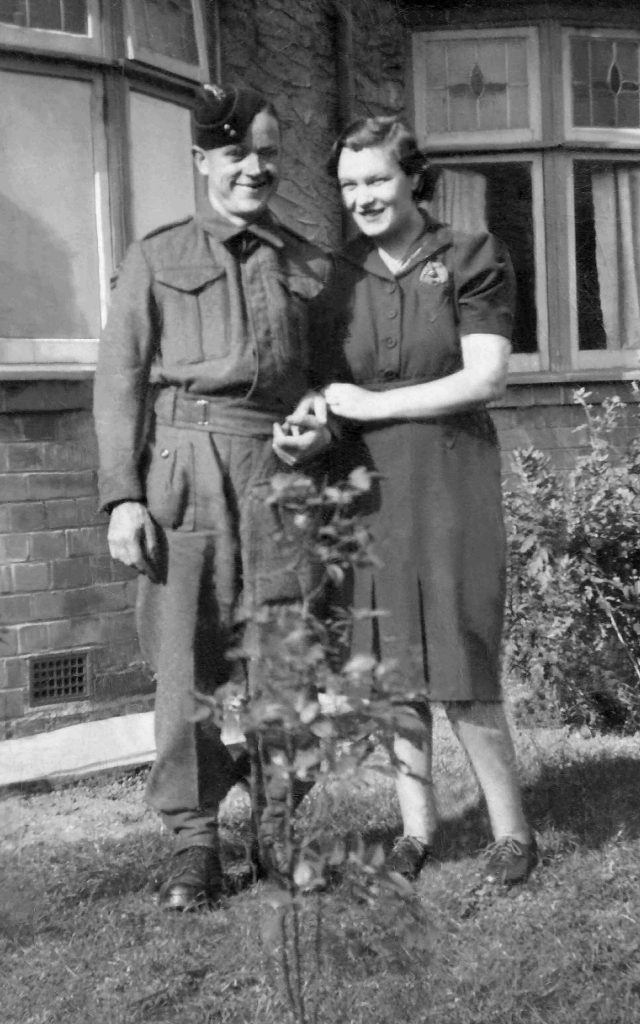 Joseph and Ruby
Joseph and Ruby
Joseph married Ruby Bird 06 August 1938 and they moved into 61 Elgar Road, Coventry. They had two children, Robert who was born in 1939 and Alan Joseph born in 1942.
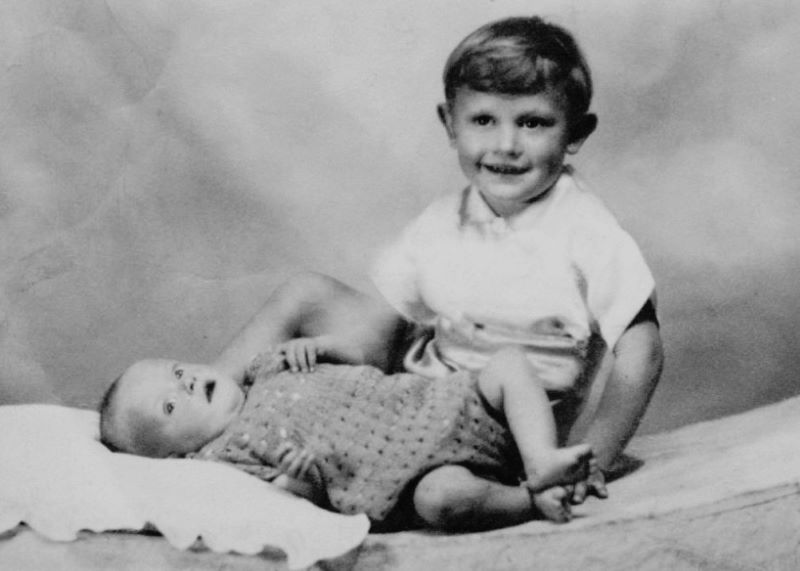
He joined the Territorial Army in February 1940 and was posted to 1st Battalion, Herefordshire Regiment. He qualified as a Bren Gun carrier driver/mechanic in March 1942. In November he was promoted to Corporal and assumed command of his own Bren Carrier. On D-Day +4, June 10th 1944 , Joseph embarked from Albert Dock in London aboard an American motor transport ship. After being delayed off Southend he landed on the extreme eastern edge of Sword Beach on June 15th. The Platoon made its way to the Battalion assembly area around the village of Cainet, about six miles inland from Gold Beach, where it joined the rest of the 11th Armoured Division.
He wrote home as often as he could. In a letter to his eldest brother Walter, dated 18 June 1944, Joseph wrote about the landings and said that all the time the vehicles were being moved from the ship on to a flat landing craft they were being shelled by what appeared to be the only big onshore German gun that was left. He said nobody seemed to be taking any notice of this gun. The shells were dropping all around them right up to the beach where they landed, hardly wetting the wheels of the vehicles. Joseph mentioned that the Navy and Air Force were supporting them well and that Spitfires were flying over them nearly all day. As usual he also said "...there is not much you can send me unless it is a few cigarettes, and you should be able to get them Duty Free from the people who send them for you. "
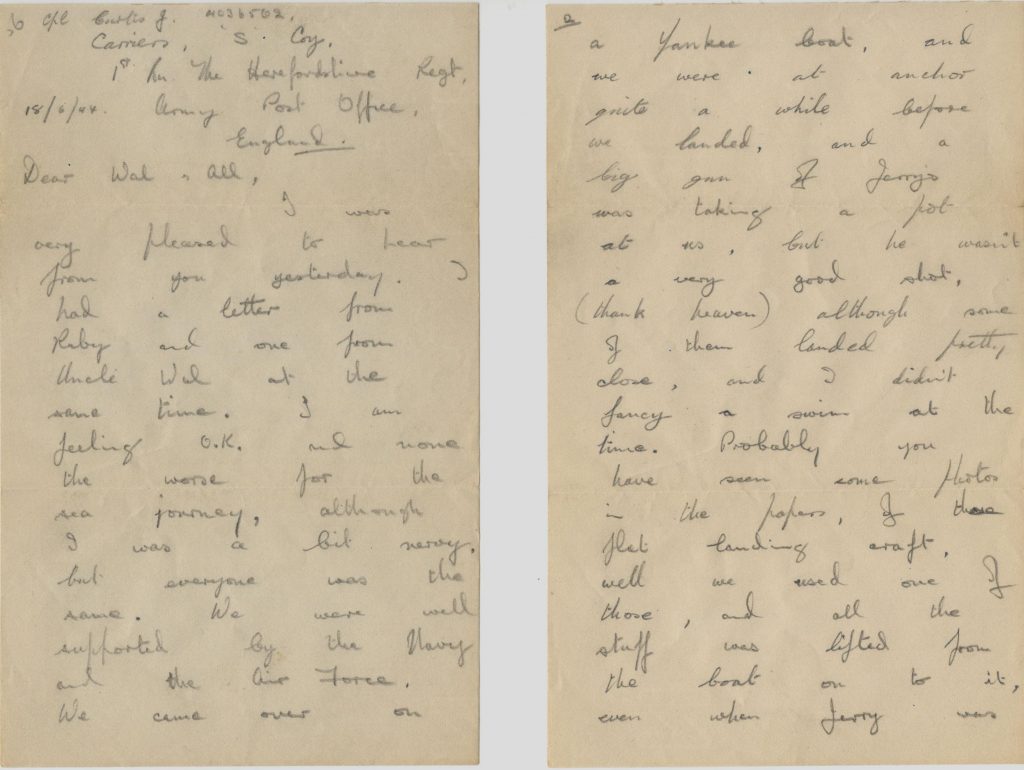
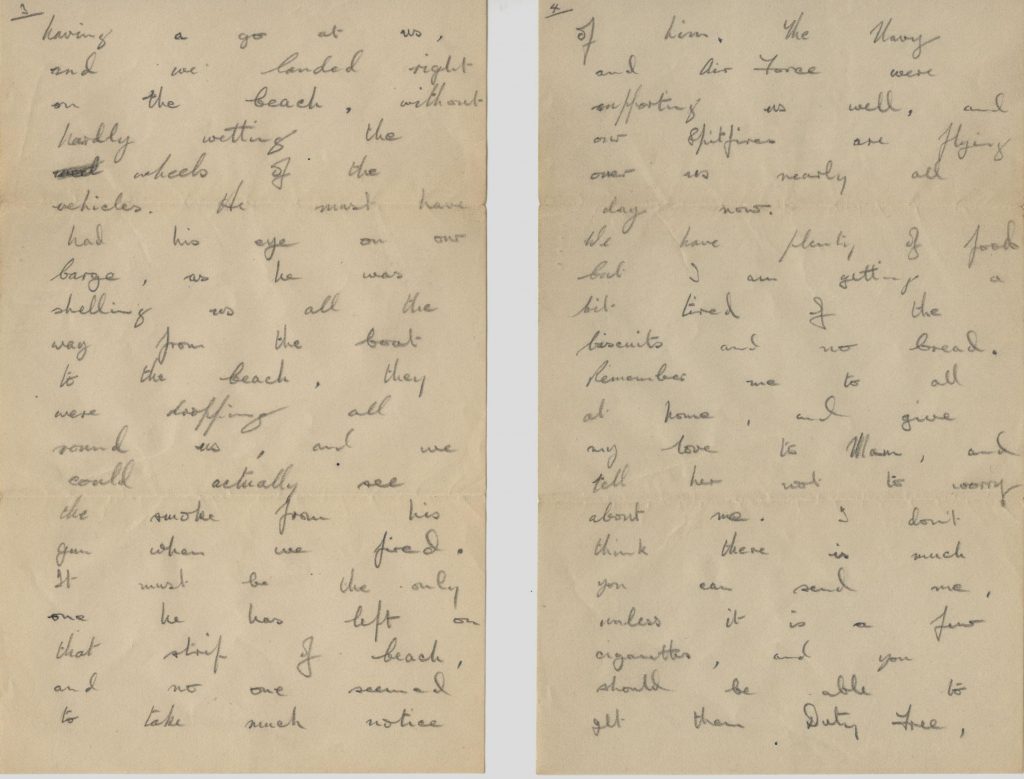
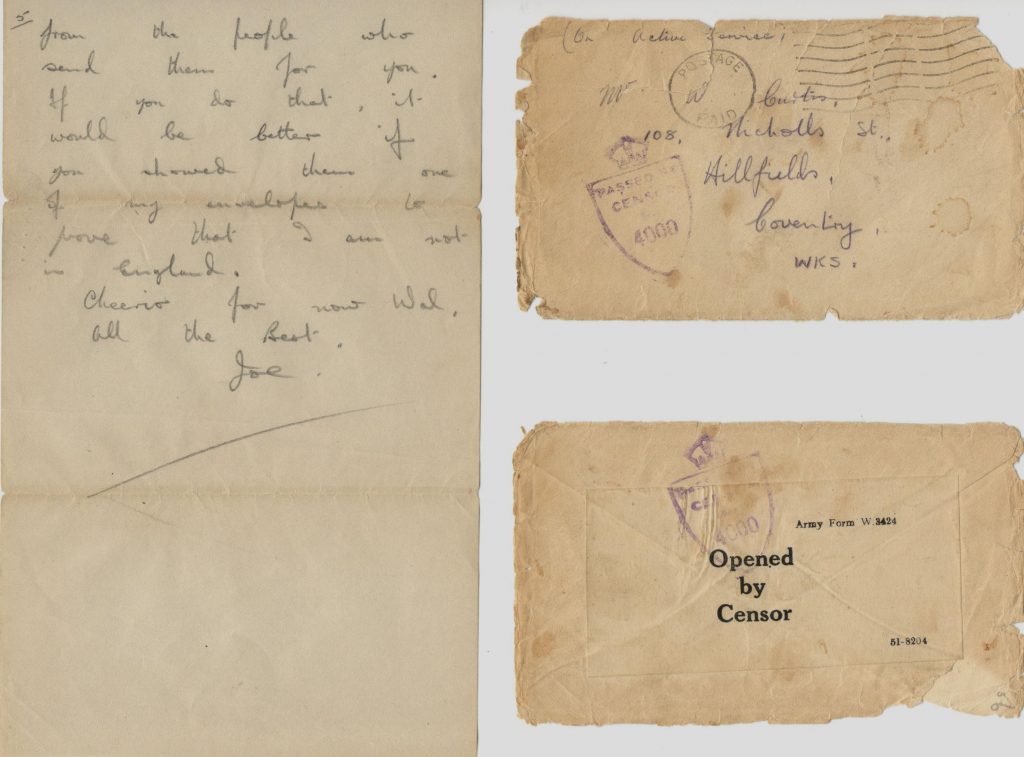
Joseph's Regiment then spent a surprisingly leisurely two weeks, de-waterproofing the vehicles, training, reading, swimming, playing sports and getting plenty of rest.
In his letter he sent to Ruby date 20 June 1944 he wrote:
"Things are going very well over here and everything points to success (...) We have had plenty of rest. There is a great variety in our rations. Do you know? We had tinned sliced peaches for sweet yesterday and they tasted delicious, and we are not short of a drink of tea. Is Bobby behaving, and is he learning at school? Tell him I want a little letter from him, or perhaps he can draw something for me. I bet Alan is a rogue now that he can get about more. Well sweetheart, I'm afraid I must close now as the light is getting bad and it is time for bed. Goodnight darling, God Bless you and the children,
Yours forever XXX Joe XXX I love you XXX".
Some of the troops in the regiment were beginning to wonder just when they were going to see any action. Although having four years of thorough training, Joseph's regiment had no combat experience.
Joseph's last letter to Ruby and children was written on 27 June 1944. It contained no hint that, at 12:15, the Battalion, part of 159 Brigade, would be moving up to an assembly area at Norrey-en-Bessin. Joseph finished his letter "Well sweetheart, I haven't any more time to spare at the moment, so I will close now, with all my love to you and the children. Yours forever XXXXXX Joe XXXXXXX."
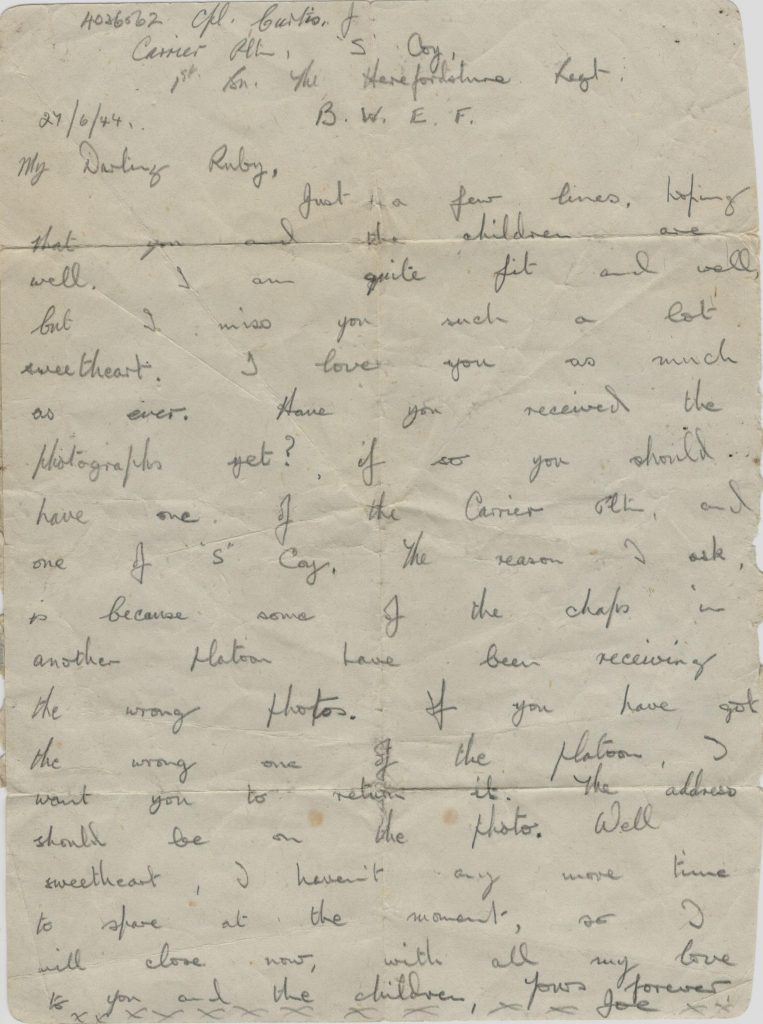
1st Battalion, Herefordshire Regiment was about to play its part in Operation Epsom. Operation Epsom began on 26th June and on 27th June the 11th Armoured Division was sent to relieve the 15th Scottish Division who had secured the small bridge over the River Odon. The Herefords crossed the Odon and were in their defensive positions in Tourmauville by 02:00 on 28th June. After 2 days of heavy fighting the 11th Armoured Division troops were withdrawn from Hill 112. The Germans re-captured Hill 112 on 30th June but 159 Brigade, including the Herefords, were ordered to remain in place to continue to hold the bridgehead over the River Odon. In the early hours of 1st July 12 British artillery regiments fired an estimated 38,000 shells on to the German positions on Hill 112. Later that morning the Herefords S Company Carrier Platoon was sent up Hill 112 along the road to Esquay for a recce. On the crest of the hill they encountered German troops who opened fire, killing Joseph Curtis instantly and injuring Captain Barneby, the Platoon commander, who died later of his wounds.
A letter of sympathy, dated 27 July 1944, was sent to Ruby from the Herefords Captain G.H. Lloyd which gave more details about Joseph's death: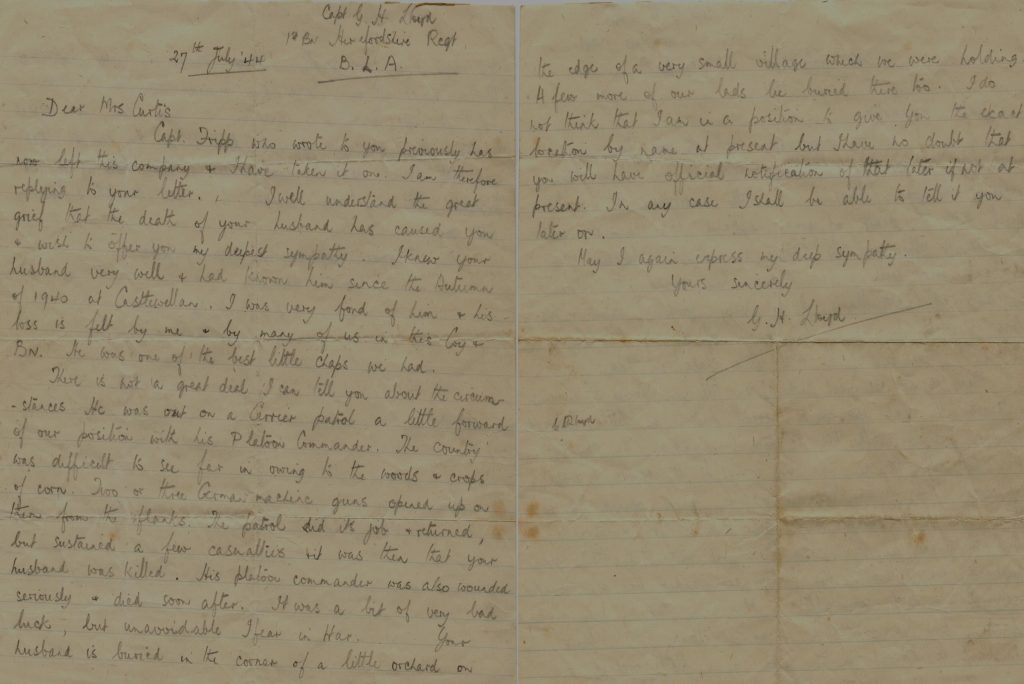
"There is not a great deal I can tell you about the circumstances. He was out on a Carrier patrol a little forward of our position with his Platoon Commander. The country was difficult to see far in owing to the woods and crops of corn. Two or three German machine guns opened up on them from the flanks. The patrol did its job and returned but sustained a few casualties, it was then that your husband was killed. His Platoon Commander was also wounded seriously and died soon after. It was a bit of very bad luck, but unavoidable I fear in War. Your Husband is buried in the corner of a little orchard on the edge of a very small village which we were holding (Tourmauville). A few more of our lads be buried there too"
He was buried in a temporary grave alongside others of the battalion who were also killed during the fighting in Tourmauville.

It was not until January 1947 that the family was informed of the final resting place of Joseph, at Banneville-la-Campagne War Cemetary.
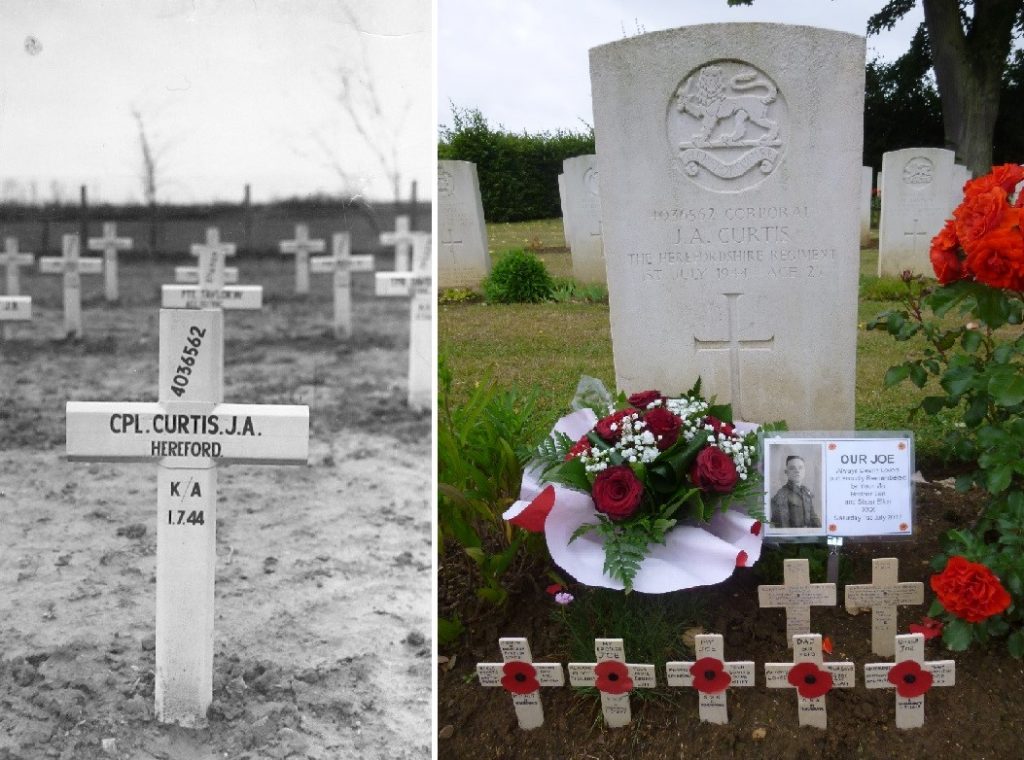
Here Joseph lies with ten others from his Regiment who died on Hill 112. The remaining one, Captain Barneby, is buried at Secqueville-en-Bessin War Cemetery.
On July 1st 2017 (the 73rd anniversary of his death) I laid a floral tribute to my uncle by the side of the Tourmauville/Esquay (D89) road at the crest of Hill 112
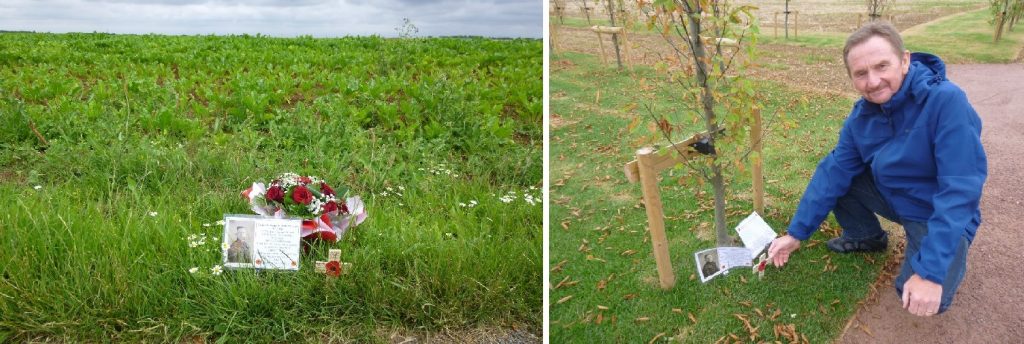
My tribute placed at the spot my uncle died Placing the tribute to my uncle at the Hill 112 Memorial
At that time I knew that point must be close to the spot where he died. I now know it was the exact spot where he died. I also visited the Hill 112 Memorial on July 1st 2017 and laid a tribute there as well.
In June 2022, I was finally able to visit the British Normandy Memorial to see Joseph's name on the memorial and I also placed a new memorial plaque at the site of the Hill 112 Memorial.
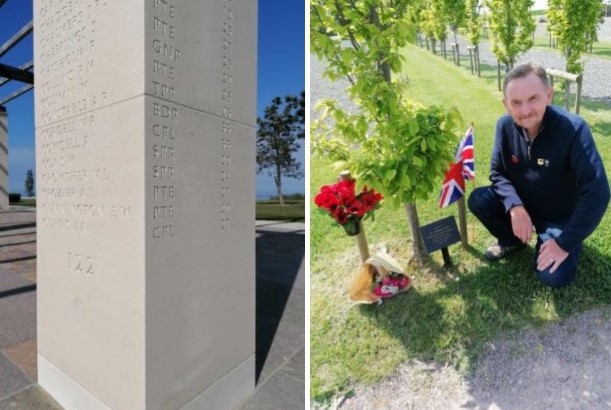
Normandy Memorial Trust - Additional Information: Operation Epsom (25 June-30 June 1944), also known as the First Battle of Odon, was intended as an attempt to outflank Caen in the west by VIII Corps. The attack and counter-attack took place over several days. The Germans contained the attack but it was the first sign that there was no longer a realistic chance of them driving the Allies back into the sea.
FALLEN HEROES
JOSEPH ALFRED CURTIS
Army • CORPORAL
King's Shropshire Light Infantry
1st Battalion, Herefordshire RegimentDIED | 01 July 1944
AGE | 27
SERVICE NO. | 4036562
RICHARD PAUL BARNEBY
Army • CAPTAIN
King\'s Shropshire Light Infantry
1st Battalion, Herefordshire RegimentDIED | 01 July 1944
AGE | 28
SERVICE NO. | 63916
FALLEN HEROES
JOSEPH ALFRED CURTIS
Army • CORPORAL
King's Shropshire Light Infantry
1st Battalion, Herefordshire RegimentDIED | 01 July 1944
AGE | 27
SERVICE NO. | 4036562
RICHARD PAUL BARNEBY
Army • CAPTAIN
King\'s Shropshire Light Infantry
1st Battalion, Herefordshire RegimentDIED | 01 July 1944
AGE | 28
SERVICE NO. | 63916




